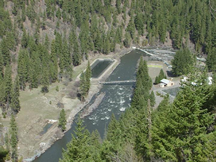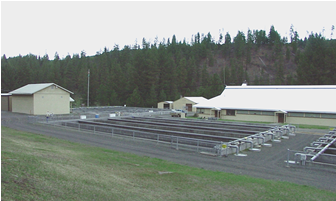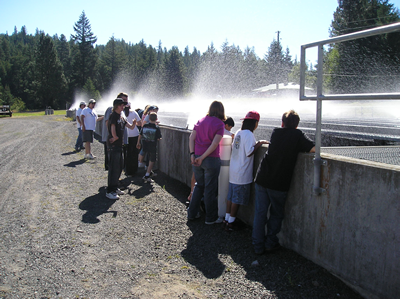 The
Klickitat Hatchery operations are federally funded by NOAA-Fisheries under
authority of the Mitchell Act. The facility is operated by the Yakama Nation
(YN), in association with the co-managed (YN & Washington Dept. of Fish
& Wildlife [WDFW]) Yakima/Klickitat
Fisheries Project (YKFP). The Klickitat Hatchery is located
7 miles east of Glenwood, Washington at river mile 42 of the Klickitat River.
The hatchery has been in continuous operation since its construction in
1949.
The
Klickitat Hatchery operations are federally funded by NOAA-Fisheries under
authority of the Mitchell Act. The facility is operated by the Yakama Nation
(YN), in association with the co-managed (YN & Washington Dept. of Fish
& Wildlife [WDFW]) Yakima/Klickitat
Fisheries Project (YKFP). The Klickitat Hatchery is located
7 miles east of Glenwood, Washington at river mile 42 of the Klickitat River.
The hatchery has been in continuous operation since its construction in
1949.
As a Columbia River Fish Management Plan (CRFMP)-managed hatchery under
U.S. v Oregon, the Klickitat Hatchery is a very important facility
used to meet Treaty Trust responsibilities of the Federal Government. The
terminal fishery in the Klickitat River provides one of the last existing
fishing sites where Yakama tribal members using traditional methods can
harvest salmon for ceremonial, subsistence, and commercial purposes. This
hatchery provides important tribal and non-tribal fisheries in Zone 1-6
of the Columbia River, as well as the Pacific Ocean.
Klickitat Hatchery Fish Data

The hatchery consists of the following buildings:
- Hatchery incubation room and early rearing (6,435 sq. ft.)
- Shop (1,280 sq. ft.)
- Freezer building (1200 sq. ft.)
- Main water supply distribution building (1,064 sq. ft.)
- Generator (250 KW)
- Storage building (2,400 sq. ft.)
- Three residences
(each 1,056 sq. ft.)
Rearing facilities consist of the following:
- Twenty-two raceways
- Three release ponds
- Six water intakes
- Two adult holding ponds
- Volunteer fish ladder (100 ft.) and trap
- Pollution abatement
pond (volume 28,350 cu. ft.)
Klickitat Hatchery rearing water supplies come from four separate water sources with six individual intakes. The water sources are:
- Indian Ford A Creek (with two intakes Indian Ford Upper A & Indian Ford Lower A
- Indian Ford B Creek (with intake Indian Ford B)
- Klickitat River (with river gravity intake & river pump)
- Wonder Springs
(gravity intake)
In addition to the intakes, there are various water reuse capabilities built into the system. The water source for the adult holding pond is the reuse system from the upper hatchery level raceway banks B & C and the incubation system. A system is in place where river water could be pumped directly through a pipeline into the north side of the holding pond, though this system has not been used since the mid-1990's, discontinued because of heavy silt/sand loadings that resulted in gill problems.
Fall Chinook and Coho Broodstock origins
Priest Rapids Hatchery adult "upriver bright" (URB) fall Chinook are the broodstock source for Klickitat Hatchery production fall Chinook eggs. In 1985, the Klickitat Hatchery stopped the transfer-in of "tule" fall Chinook, switching to URB fall Chinook as a more desirable harvest stock. Type N* coho eggs can come from any lower Columbia River Type N coho stocks. These are stocks derived from Cowlitz Late stock coho that were introduced to the Washougal Hatchery in 1985. Other hatcheries that have provided Type N coho eggs are: Cowlitz, Washougal, Lewis River, Kalama River, and Elochoman Hatcheries.
 Visiting
or Contacting the Klickitat Hatchery
Visiting
or Contacting the Klickitat Hatchery
Hatchery tours are available to visitors. To arrange a visit, please contact Klickitat Hatchery:
Phone: 509-364-3310
*Type N coho: A coho stock that rears in ocean waters off the mouth of the Columbia River and northward to the northern Washington coast (StreamNet).